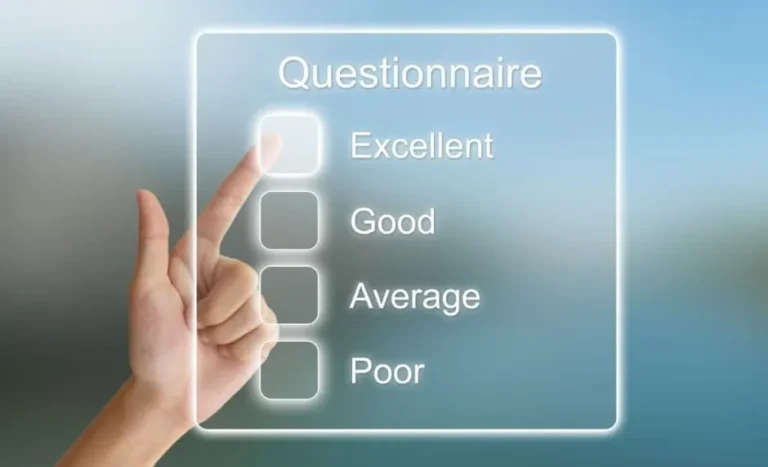Meetings are a fundamental part of any organization’s workflow, but they can also be a major source of frustration and inefficiency.
In fact, a study conducted by Harvard Business Review found that executives spend an average of 23 hours per week in meetings, with 71% of them considering a significant portion of those meetings to be unproductive.
Effective meetings start with asking the right questions. By framing the discussion around specific goals and objectives, and using targeted survey questions, you can ensure that your meetings are purposeful, efficient, and result-oriented.
In this article, we will explore the importance of well-crafted survey questions in meetings and how they can transform your meeting experience for the better. We’ll also show you some examples of meeting survey questions you can use before and after starting a meeting.
Let’s get started!
Table of contents
- What is the purpose of a meeting survey?
- Can I create my own custom questions for a meeting survey?
- When is the best time to send out a meeting survey?
- How do I analyze the results of a meeting survey?
- Meeting Survey Questions To Boost Audience Engagement
- Frequently Asked Questions
- Conclusion
- References
- Recommendations
Read Also: 250+ Best Taylor Swift Trivia Questions and Answers (Easiest to Hardest)
What is the purpose of a meeting survey?
The purpose of a meeting survey is to gather feedback and insights from participants in order to improve future meetings.
By asking questions about the effectiveness of the meeting, the relevance of the topics discussed, and the overall experience, organizers can gain valuable information to make necessary adjustments for future gatherings.
Meeting surveys also provide an opportunity for participants to express their thoughts and suggestions, fostering a culture of open communication and continuous improvement within the organization.
Additionally, meeting surveys help to measure participant engagement and satisfaction, allowing organizers to identify areas for improvement and address any concerns or issues that may have arisen during the meeting.
This feedback can be instrumental in shaping the agenda, format, and structure of future meetings, ensuring that they are productive, engaging, and valuable for all involved.
Ultimately, the purpose of a meeting survey is to create a platform for constructive feedback and collaboration that leads to more effective and successful meetings in the future.
Read Also: 250+ Best 4th Grade Vacation Trivia Questions and Answers (Easiest to Hardest)
Can I create my own custom questions for a meeting survey?
Yes, you can create your own custom questions for a meeting survey. Many survey platforms and tools allow you to customize the questions to fit your specific needs.
Whether you want to gather feedback on a recent meeting, gauge attendees’ satisfaction, or gather suggestions for improvement, customizing your survey questions can help you get the insights you’re looking for.
When creating custom questions for a meeting survey, consider the specific information you want to gather and the goals of the survey. Tailoring your questions to align with these objectives will ensure that you collect relevant and actionable feedback from meeting participants.
Additionally, make sure to keep your questions clear and concise to encourage maximum participation and thoughtful responses.
When is the best time to send out a meeting survey?
The best time to send out a meeting survey is typically 1-2 weeks before the scheduled meeting. This allows participants enough time to respond and ensures that their feedback can be incorporated into the meeting agenda.
Sending the survey too far in advance may result in participants forgetting to respond, while sending it too close to the meeting date may not leave enough time for thoughtful responses.
It’s also important to consider the day of the week and time of day when sending out the survey. For example, sending it on a Monday morning might get lost in a busy inbox, while sending it on a Thursday afternoon may catch people at a less hectic time.
Ultimately, it’s best to aim for a time when participants are likely to have some free moments to consider their responses thoughtfully.
How do I analyze the results of a meeting survey?
Analyzing the results of a meeting survey can provide valuable insights into the effectiveness of your meetings and help identify areas for improvement.
Start by reviewing the overall feedback and identifying any recurring themes or trends. Look for common issues or suggestions that participants have mentioned, such as time management, agenda clarity, or participation levels.
Next, consider segmenting the data based on different demographics or participant groups to gain a more nuanced understanding of the feedback. For example, you might compare responses from different departments, seniority levels, or meeting formats to see if any specific patterns emerge.
Finally, use the survey results to create an action plan for addressing any identified issues and improving future meetings.
By taking a thoughtful approach to analyzing the survey data, you can make meaningful changes that enhance the overall meeting experience for everyone involved.
Read Also: 250+ Best Holiday Trivia Questions and Answers (Easiest to Hardest)
Meeting Survey Questions To Boost Audience Engagement
General Meeting Survey Questions:
- On a scale of 1-10, how satisfied are you with the overall organization and structure of this meeting?
- Did the meeting agenda effectively address the topics you were expecting to discuss?
- How likely are you to recommend similar meetings to your colleagues or peers?
- Were the meeting objectives clearly communicated and achieved?
- Did you feel that your input was valued during the meeting?
- Were the meeting materials (slides, handouts, etc.) helpful in understanding the content?
- How would you rate the duration of the meeting? Too short, too long, or just right?
- Were there any technical or logistical issues that hindered your participation in the meeting?
- Did the meeting facilitator effectively manage discussions and keep the meeting on track?
- What suggestions do you have for improving future meetings?
Pre-Meeting Survey Questions:
- Are there any specific topics or questions you hope will be addressed during the meeting?
- How prepared do you feel for the upcoming meeting?
- Do you have any concerns or reservations about the meeting agenda?
- What outcomes or decisions do you hope will result from this meeting?
- Is there anything you would like to share with the meeting organizer or facilitator before the meeting begins?
- How important is this meeting to your current projects or responsibilities?
- Are there any particular challenges you anticipate facing during the meeting?
- Do you have any suggestions for improving the effectiveness of future pre-meeting communications?
- How would you rate your level of excitement or enthusiasm for this meeting?
- Is there anything else you would like to add before the meeting starts?
Post-Meeting Survey Questions:
- Did the meeting achieve its stated objectives?
- Were the action items and next steps clearly defined during the meeting?
- How likely are you to follow through on the commitments made during the meeting?
- Did the meeting outcome align with your expectations?
- Were there any unresolved issues or topics that should be addressed in future meetings?
- How well do you think the meeting facilitated collaboration and teamwork?
- Did you feel that your time was well spent in this meeting?
- What was the most valuable takeaway from the meeting for you?
- How would you rate the overall effectiveness of this meeting?
- Do you have any additional comments or feedback about the meeting?
Team Meeting Survey Questions:
- How would you rate the level of participation from all team members during the meeting?
- Did the meeting foster a sense of unity and cohesion within the team?
- Were team goals and priorities effectively communicated and reinforced during the meeting?
- Did the meeting provide a platform for open and honest communication among team members?
- How well do you think conflicts or disagreements were addressed during the meeting?
- Were decisions made during the meeting supported by consensus among team members?
- Did the meeting enhance your understanding of your role within the team and its objectives?
- How would you rate the level of engagement and energy within the team during the meeting?
- Were action items and responsibilities clearly assigned to team members?
- What suggestions do you have for improving team meetings in the future?
Post Virtual Meeting Survey Questions:
- How would you rate the technical quality of the virtual meeting platform used?
- Did you encounter any challenges accessing or participating in the virtual meeting?
- Were the virtual meeting features (e.g., chat, polling, breakout rooms) effectively utilized?
- How would you rate the overall engagement level of participants during the virtual meeting?
- Did the virtual meeting format impact your ability to collaborate or communicate effectively?
- Were you able to maintain focus and attention during the virtual meeting?
- How would you rate the facilitator’s ability to manage discussions and interactions in the virtual environment?
- Did the virtual meeting adequately replicate the experience of an in-person meeting?
- What suggestions do you have for improving the virtual meeting experience in the future?
- How likely are you to participate in future virtual meetings?
Employee Meeting Survey Questions:
- How would you rate the relevance of the meeting topics to your role and responsibilities?
- Did the meeting provide valuable insights or information relevant to your work?
- How well do you think the meeting addressed employee concerns or feedback?
- Were opportunities for professional development or growth discussed during the meeting?
- Did the meeting contribute to a positive and supportive work culture?
- How well do you feel your contributions and opinions were valued during the meeting?
- Were any changes or initiatives discussed during the meeting that will impact your work?
- How would you rate the level of transparency and communication during the meeting?
- Did the meeting foster a sense of belonging and connection among employees?
- What additional topics or areas would you like to see addressed in future employee meetings?
Zoom Meeting Survey Questions:
- How would you rate the audio and video quality during the Zoom meeting?
- Did you encounter any difficulties joining or accessing the Zoom meeting?
- Were the Zoom meeting controls easy to use and navigate?
- How well did the Zoom meeting facilitate interaction and engagement among participants?
- Were breakout rooms utilized effectively during the Zoom meeting?
- Did you experience any distractions or interruptions during the Zoom meeting?
- How would you rate the overall experience of participating in a Zoom meeting?
- Were you able to effectively communicate and collaborate with other participants during the Zoom meeting?
- Did the Zoom meeting format impact your ability to focus and participate actively?
- What suggestions do you have for improving the Zoom meeting experience in the future?
Post Sales Meeting Survey Questions:
- Did the meeting provide valuable insights or information relevant to your sales role?
- How well do you think the meeting addressed customer needs or market trends?
- Were sales strategies or tactics discussed during the meeting that you found particularly useful?
- Did the meeting provide clarity on sales targets or objectives?
- How well do you feel your input and feedback were incorporated into the meeting discussions?
- Were any challenges or obstacles to achieving sales goals addressed during the meeting?
- Did the meeting provide opportunities for skill development or sales training?
- How would you rate the effectiveness of the meeting in motivating you to achieve sales targets?
- Were any changes or updates to products or services discussed during the meeting?
- What additional support or resources do you need to succeed based on the discussions in the meeting?
Frequently Asked Questions
Meeting surveys can be anonymous if you choose that option, which may encourage more honest feedback from participants.
You can analyze the results of a meeting survey using online survey tools or by manually reviewing responses to identify common themes and areas for improvement.
Yes, sharing the results of a meeting survey with participants demonstrates transparency and allows them to see how their feedback has been used.
Conclusion
Using well-crafted meeting survey questions can greatly enhance the productivity and effectiveness of your meetings.
By gathering feedback from participants, you can identify areas for improvement and make necessary adjustments to ensure future meetings are more successful.
Additionally, asking targeted questions can help you gauge participant engagement and satisfaction, ultimately leading to a more positive meeting experience for everyone involved.
Remember to carefully consider the specific goals and objectives of each meeting when designing your survey questions, and be open to adjusting them as needed.
Give it a try and see the positive impact it can have on your next meeting.
References
Recommendations
- 250+ Best WWE Vacation Trivia Questions and Answers (Easiest to Hardest)
- 300+ Best Bible Trivia for Kids Questions and Answers (Easiest to Hardest)
- 250+ Best Disney Trivia Questions and Answers
- 150+ Easy-to-Answer Trivia Questions to Spice Up Your Night
- 200+ Best US History Trivia Questions That You’ll Love





